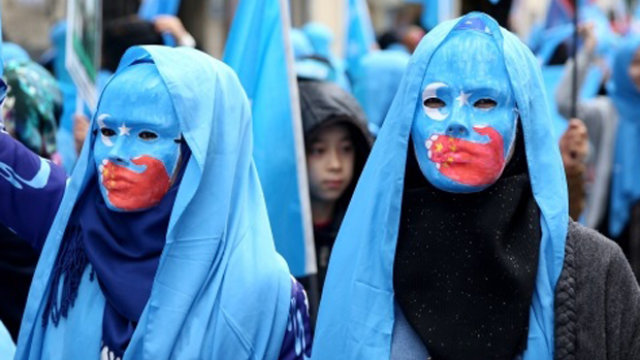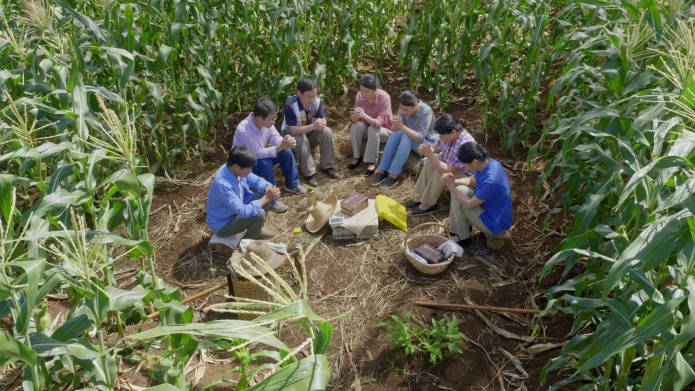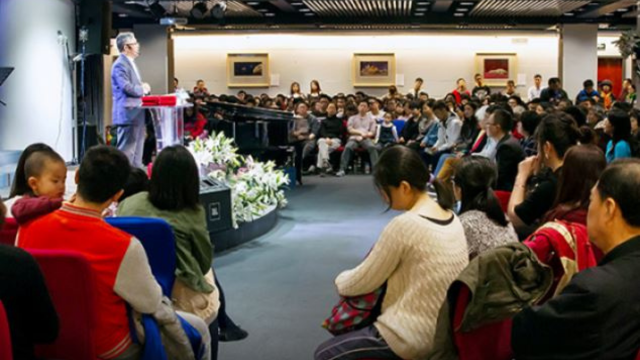The global Jewish community is refusing to stay silent in the face of mounting human rights atrocities perpetrated against the Uyghurs.

by Ruth Ingram
With Holocaust memorial day in January around the corner, and World Human Rights Day on December 10 coinciding this year with Hanukkah, the festival of lights, Jewish groups around the world have been gathering to express solidarity with Uyghurs and to proclaim, “Never Again!”
Jewish leaders joined forces with Uyghur counterparts for the first time this year to light the Hanukkah candles together, and pledge their determination not to “stand idly by” in the face of the mass injustices being perpetrated by the CCP in Xinjiang.
At the same time, Jewish students from 30 cities around the world, in a global day of action, draped banners containing clauses from the Universal Declaration of Human Rights (UDHR) on footpaths in front of embassy gates, forcing Chinese officials symbolically to trample on those very same rights as they came and went into their compounds.
Representing 160,000 young Jews, the European Union of Jewish Students started the Jewish Movement for Uyghur Freedom a year ago to mobilize their people to stand up against the genocide in the Uygur heartland. “We have stood alone too often,” said president Beni Guttman. “We will ensure that other persecuted people do not share the same fate,” assuring Uyghurs that Jews would continue to stand together with them hand in hand. Their day of global protest included drafting a letter to the UN secretary general urging immediate action.
Speaking at one of two special events to mark Hanukkah with Uyghur guests, Mia Hasenson-Gross, the director of the Jewish human rights group René Cassin, said that history gave Jews a “uniquely authoritative voice” to speak out against the persecution of others. “Jews understand the need for empathy and solidarity,” she said.
Gathering in spirit on Zoom, but with promises of live encounters next year, Jews spoke up for the desperate need to prevent another holocaust.
The uncanny similarity between attempts to wipe out Jewish culture and religion over the millennia and the current CCP push to annihilate Uyghur holy sites, culture, language, and religion, was too powerful to ignore, stressed Beni Guttman, who urged the world to “take sides.” He repeated holocaust survivor Ellie Wiesel’s words that “neutrality helps the oppressor and never the victim.” “Silence encourages the tormentor and never the tormented,” said Guttman, who added that history has taught the Jewish community to be “as loud as it could” in the face of genocide.
Just as the Greek attempt two thousand years ago to Hellenize the Jews was thwarted by courageous Maccabean resistance, so they hoped the Goliath of China could be similarly overcome, he said. In the same way that the Menorah of the newly rededicated Temple was lit by a small jar of oil that “miraculously” lasted eight days, he hoped the Uyghurs would take courage as they persevered against seemingly hopeless odds.
“The history of Hanukkah has shown us that even in the darkest times, there’s still hope and there’s still light,” he said.
Rahima Mahmut, representative of the World Uyghur Congress in London, moved by Jewish solidarity in one of her nation’s darkest hours took hope from their struggle, and saw the candles burning as symbols of light and hope. “Just as you fought against the Greeks and you won your freedom,” she said, “now you are fighting for us and our freedom.
Echoes of the past being repeated in Uyghurs being taken at night, their heads shaved, and herded onto trains for uncertain futures and slave labor, were not lost on the executive director of Jewish World Watch, Serena Oberstein who urged the world to hold the CCP accountable. “We must be the moral compass together with the United States for the rest of the world,” she said. “We must create light together where there is immense darkness.”
Other prominent Jews have raised their voices recently against the tragedy unfolding in Xinjiang. In a recent webinar, survivor of the Nazi holocaust Ruth Barnett, MBE, who arrived in Britain on the kinder transport, warned the world against ignoring the signs of impending genocide. “Atrocity doesn’t suddenly happen. It can all be stopped,” she believes, citing the Armenian genocide which despite clear evidence, continues to be denied. “Because it is denied, it will continue to be toxic until it is admitted.”
She adds, “Had the original Ottoman genocide against Christians and Jews been brought to full acceptance, the Holocaust would have been stopped.” Because of the subsequent silence, she maintains, other genocides have been allowed to happen. “We collectively allow them to happen,” she regrets.
The Chief Rabbi of the United Hebrew Congregations of the Commonwealth has also raised his voice in support of the Uyghurs. recently unable to remain silent in the face of mounting atrocities and world inaction.
In a Guardian opinion piece, Ephraim Mirvis, quoting Ellie Wiesel’s observation that “whoever listens to a witness becomes a witness,” said that he felt compelled to speak out as he “reflected upon the deep pain of Jewish persecution throughout the ages.”
He lamented that both the UDHR and the Convention on the Prevention and Punishment of the Crime of Genocide, which, he noted, stand among humanity’s most vital legal and moral proclamations, “are at risk of fading into the political periphery if we are not prepared to act upon them.”
“The freedoms we enjoy, coupled with a perception that nothing we do will help, often create a culture of apathy,” he said. “Time and again, history has taught us that it is precisely such apathy that permits hatred to flourish. The Talmud teaches that, ‘We are not expected to complete the task, but neither are we free to desist from it.’”
Source: Bitter Winter












